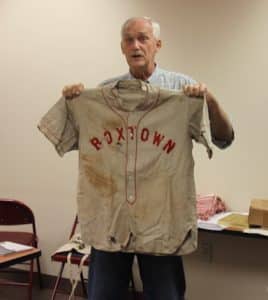Memories of Boxtown

A local town that featured a school, grocery store, tavern, train depot, and dance hall (and three murders) now only exists in pictures.
There is not even a road sign that tells of Boxtown’s existence.
Monroe County Commissioner Ronald Schultheis and other former residents of Boxtown gathered at Morrison-Talbott Library in Waterloo on Thursday night during a meeting of the Monroe County Genealogical Society to reminisce about their old stomping grounds.
Schultheis, who was born in the “Renault Holler” and lived in Boxtown until 1974 – when he moved to Fults – began his presentation with a history of that area.
Boxtown began as Kidd, a town named after Robert Kidd, who had been a part of Brigadier General George Rogers Clark’s Illinois expeditions during the Revolutionary War. It was located just 2.5 miles north of Fort de Chartres.
Most of the tracts in Boxtown are parallel, long and narrow areas that stretch from the bluff to the river as a result of the “Renault Grant” that gave Revolutionary War-era militiamen land – although the mercenaries who were granted land sold to locals for profit.
Schultheis still owns land in the area, which he has preserved in hopes that people “will always be able to walk to the river.”
The plot structures had another benefit, according to longtime local resident Merrill Prange. Because the fields were so narrow, “the French settlers would all start farming in the same place and farm side-by-side and then they would only have to look in one direction” in case of attacks by Native Americans.
By the 1920s, when Schultheis’ grandparents lived in Boxtown, things were slightly more civil.
The advent of the railroad made Boxtown a regular stop for trains running from the south to St. Louis. It is also how it got its name. People described the town as a “box of houses,” hence Boxtown.
The locals called the train the “Dinky.” The train would regularly transport dairy products from local farms to St. Louis and residents would also ride the Dinky to the big city.
Some of Schultheis’ family and other locals had another use for the train during prohibition in the 1920s. Schultheis described the practice of placing hay around the perimeter of a boxcar and then filling the center with crates of moonshine.
Prange explained that Boxtown was a good location for illegal liquor production due to its proximity to Randolph County.
“If the sheriff showed up, all you’d have to do is run south and he wouldn’t cross the (county) line,” Prange said.
Nevertheless, Boxtown had a few visits from the “revenuers” – government officials who enforced liquor laws.
In a 1923 raid, four stills were discovered and destroyed. Schultheis estimated these stills produced tens of thousands of gallons of illegal whiskey.
In 1927, two stills were discovered along with 42,000 gallons of mash and 65 gallons of booze, according to Schultheis.
Former residents also shared stories about Boxtown, such as going to dances, watching wrestling on Saturday nights at McClenahan’s Tavern and having to pay a dime to a local curmudgeon for any baseball from the school grounds that ended up in his yard.
One tale told of local hunters who went to Jost’s Tavern in Fults – not just for drinks – but to apologize to the owner, who was also the game warden, after being found by the river with a few too many animals in their traps.
Schultheis also shared artifacts from the town, including original plat books from 1875 and the early 1900s, a box of trinkets including a matchbook from McClenahan’s Tavern, a Monroe County throw blanket that features the names Kidd and Boxtown, a small box from the lumber store and a Boxtown baseball team jersey worn by his uncle Ray.
What Schultheis remembers most fondly about Boxtown is the community itself.
The area “tied families together,” he said.
As transportation improved and more moved from the farms, Boxtown gradually lost residents and is now no longer in existence.
Schultheis’ father had a prophetic statement about the fate of the town when the “big” levee was built after flooding in the 1940s. Schultheis’ father told him that the levee would “never blow, but it’ll get topped.”
The Flood of 1993, washed away any physical reminders of the town Schultheis called home.
While Boxtown is gone, it lives on in the memories of those who knew it.






